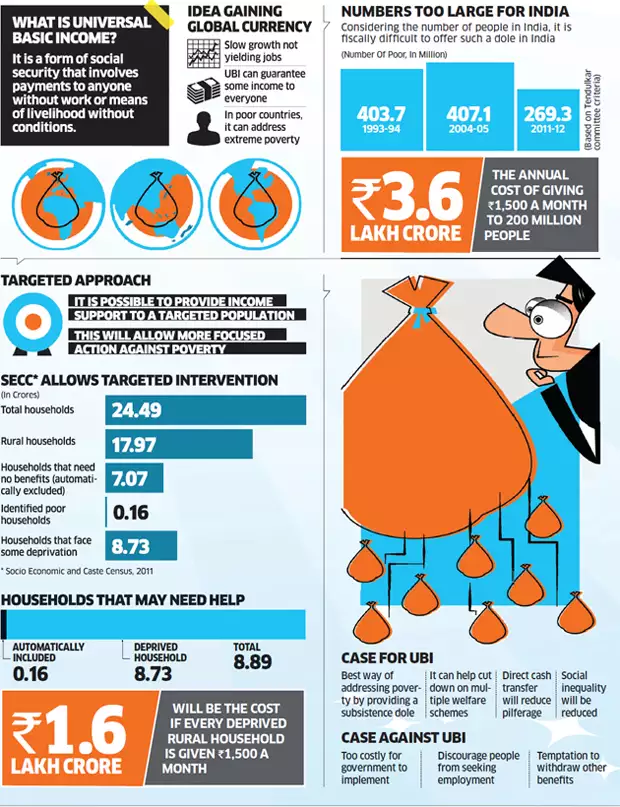30 Aug Universal Basic Insurance – An alternative to Universal Basic Income
Universal Basic Income Scheme
Although, there are hundreds of poverty alleviation programs in India, aim to cater from cradle to grave. However, their effectiveness and efficiency have been in question. The article talks about how Universal Basic Income Scheme impacts the Indian Economy.
A brief history of targeting in India
India’s experience with the targeted delivery of welfare programs has not been much encouraging. Targeted delivery started in the 1990s based on self-reporting income criteria to identify the poor.
- Later in the 2000s multidimensional criteria were used to identify the poor. However, all of these endeavors have not been able to remove the issues of manipulation and corruption, which crowd out the poor and the truly deserving BPL cardholder and serve the already uplifted (usually middle class).
Universal/Minimum Basic Income (UBI)
In the developed world, fears of automation have spurred thinkers to devise some ways to deal with the issue. Similar trends are being observed in India as according to World Bank 69% of jobs in India are under the threat of automation.
- Also, despite making remarkable progress in bringing down poverty from about 70% at independence to about 22% (Tendulkar Committee), it can safely be said that “wiping tears from every eye” (Gandhi) has not been possible.
- Also, as Nehru exhorted “so long as there are tears and suffering, so long our work will not be over” is very much true nearly 70 years after independence.

Universal Basic Income
State governments efforts
Sikkim is set to become the first state in India to roll out Universal Basic Income (UBI).
Support:
Economics Nobel Laureates Peter Diamond and Christopher Pissarides, and tech leaders Mark Zuckerberg and Elon Musk.
Characteristics of the UBI scheme
A basic income has the five following characteristics:
- Periodic: it is paid at regular intervals (for example every month), not as a one-off grant.
- Cash payment: Allowing those who receive it to decide what they spend it on. It is not, therefore, paid either in kind (such as food or services) or in vouchers dedicated to a specific use.
- Individual: It is paid on an individual basis—and not, for instance, to households.
- Universal: It is paid to all, without means test.
- Unconditional: It is paid without a requirement to work or to demonstrate a willingness to work.
How does UBI liberate the citizens from paternalistic and clientelistic relationships with the state?
- Clientelistic Relationship: The client (people) gives political or financial support to a patron (as in the form of votes) in exchange for some special privilege or benefit [Demand polity according to Rudolf & Rudolf]. Ex- election freebies. As UBI would be Universal, it will kill all such incentives.
- Paternalism is the system in which the state acquires too much power under the argument of making individuals better off or giving protection. UBI would be in cash so the receiver could exercise his discretion to maximize his interests, without the state’s interference to decide on his/her behalf.
What are the main arguments against a universal basic income?
- It would reduce the motivation for work. However, test experiments done in some villages in MP and in a few developing countries like Indonesia and the Philippines shows that it rather improved the standard of living and entrepreneurship.
- Simply unaffordable for India, as it is estimated that paying a basic income equivalent to the poverty line would entail a cost of 11- 12.5% of GDP, which is equivalent to the Union govt. budget. While govt. total subsidies are about 4-4.5% of GDP.
In discussing the merits and demerits of the UBI or any other development policy, it is important to avoid some standard pitfalls.
- No one size does not fit all nor a magic pill can cure all problems, as different policies could work well in different contexts in different societies. Cash transfers only make sense if you have ready access to markets, which is not true if you live in remote rural areas. Thus, at least in such cases, there is a need for some in-kind transfers.
- So yes, a UBI will provide some relief to the poor, but will not provide a long-term solution to the problem of poverty. For this govt. needs to invest in health, education, and skill formation.
- Also, it’s accused that UBI is being contemplated by the govt. as a replacement for the public distribution system (PDS) and food, fuel, and fertilizer subsidies. On the contrary, it is just about giving cash under one umbrella, what is already being given (in-kind and cash benefits) via different channels. Thus, UBI is not an add-on, which it should be, at least in the early stages.
Possible alternative – Universal Basic Insurance:
- Low insurance penetration: The insurance penetration (premium as a percentage of GDP) in India has been hovering around 4% for many years compared to 17%, 9%, and 6% in Taiwan, Japan, and China, respectively. Thus, insurance can become a need-based safety net for the poor.
- Availability of Data: The economy largely remains informal, data from that informal sector are now available both for businesses (through GSTIN, or Goods and Services Tax Identification Number) and for unorganized workers (through e-Shram, which is the centralized database of all unorganized workers).
Thus, it can be seen that Universal Basic Income needs a much-needed solution to the issue being faced by the polity, economy, and society. For the time being the idea of Universal Basic Insurance can be implemented.
Source:
Image Source:
Daily Current Affairs for UPSC
Get the best daily current affairs for the UPSC examination from the Plutus IAS. We provide the latest and updated current affairs for UPSC aspirants. Also, read monthly and weekly current affairs free of cost for IAS exam preparation.




No Comments